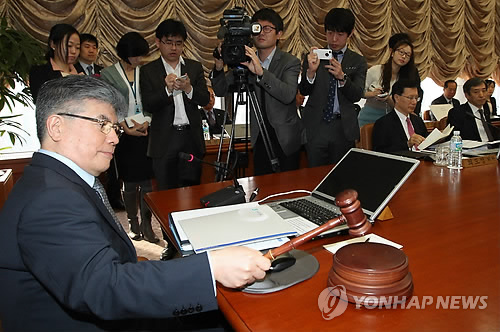ID :
231787
Thu, 03/08/2012 - 03:40
Auther :
Shortlink :
https://www.oananews.org//node/231787
The shortlink copeid
BOK holds key rate steady for 9th month in March

SEOUL, March 8 (Yonhap) -- South Korea's central bank on Thursday left the key interest rate unchanged for the ninth straight month in March, as rising oil prices threaten to build up inflationary pressures and fragile signs of economic revival at home and abroad continue to challenge policymakers.
Bank of Korea (BOK) Gov. Kim Choong-soo and his five fellow policymakers froze the benchmark 7-day repo rate at 3.25 percent for this month, as widely expected.
All 18 analysts polled by Yonhap Infomax, the financial news arm of Yonhap News Agency, forecast a rate freeze for March.
The BOK cut the benchmark rate by 3.25 percentage points to a record low of 2 percent between October 2008 and February 2009 in the wake of the global financial crisis. Since July 2010, it has raised borrowing costs by 1.25 percentage points in five steps to curb inflation.
Many analysts expected the central bank to raise its rhetoric on inflation as global oil prices hit US$120 per barrel last month, which could complicate the on-going inflation fight by the government and the monetary policymakers.
"Inflation pressures will build again on rising oil prices as the high base effect begins to wash out and growth picks up," Ronald Man, an economist at HSBC Corp., said in a report ahead of the monetary policy meeting. "Focus is back on inflation."
Even as South Korea's on-year headline inflation rate eased to a 14-month low in February, analysts said the base effect from last year masked the stubbornly high inflation rate.
South Korea's consumer price index rose 3.1 percent on-year in February, with the growth rate staying within the central bank's target rate of 2 to 4 percent.
Compared with the previous month, however, consumer prices rose 0.4 percent last month. Consumer prices may rise this month from February as the latest figure did not take into account recent hikes in public prices, such as transportation fees, analysts said.
A rise in oil prices, which has been triggered by a U.S.-led campaign to deter Iran's nuclear ambitions, and the reports that the U.S. economy has begun to show signs of life, weakens the case for a further monetary easing for the rest of the year, they said.
Yet signs of an economic recovery at home and abroad are not strong enough to convince BOK monetary policymakers to resume monetary tightening, they added.
Higher oil prices are widely expected to have a negative impact on growth in Asia's fourth-largest economy and other Asian oil importers, prompting many analysts to be keen on BOK's remarks on oil prices this month.
"How the BOK estimates the impact of higher oil prices on the economic slowdown and on inflation will be closely watched," said Hong Jung-hye, an analyst at Shinyoung Securities Co.
(END)





